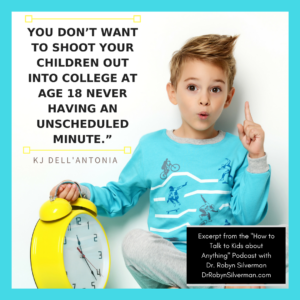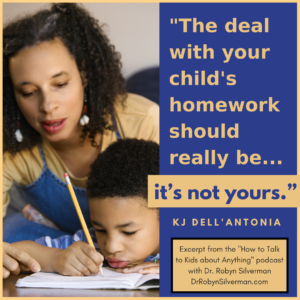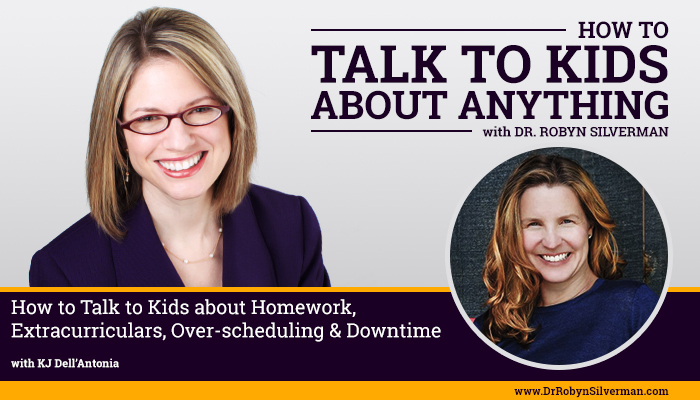Podcast: Play in new window | Download
Subscribe: Apple Podcasts | RSS | More
Homework, Extracurriculars, Over-Scheduling & Downtime
This podcast focuses on balancing and making sense of a healthy schedule for your child. What’s too much? What activities are worthwhile? Do we really need to schedule downtime? KJ Dell’Antonia talks with Dr. Robyn Silverman about homework, extracurriculars, over-scheduling and the need (and often lack of) downtime in the lives of children, teens and parents.
 With so many opportunities and demands made on children today, it can be hard to balance sports, homework, activities and yes, if we can muster it, downtime for our kids. How do we help our children and our families make decisions about what to commit to and what to forego during the already busy school year?
With so many opportunities and demands made on children today, it can be hard to balance sports, homework, activities and yes, if we can muster it, downtime for our kids. How do we help our children and our families make decisions about what to commit to and what to forego during the already busy school year?
We are right at that moment in my own house, as my daughter signed up for violin this year within her school— but was learning piano last year after school, learned guitar in summer camp— so…does she do all three now? And let’s not forget that she also take gymnastics and “mom, can I take horseback riding too?”— oh! And Hebrew school, we’ve got that also. And did I mention I have a son? For him, soccer, mad science and yes, Hebrew school as well. Just looked at all the options can make a parent tired. We give ourselves a lot of pep talks about how our kids behave better when they ‘re busy, and we have to work so our kids might as well be doing something productive and isn’t it better for them to be around other kids expanding their minds, seeking their passion or moving their bodies? And if yes, which direction do we go and how can we remain grounded, sane and happy in the process?
For a discussion about sports, homework, after-school activities, downtime and how to get it all in to our schedules, we are turning to guest, KJ Dell’Antonia for a second time (she was on in March talking about how to be a happier parent).
Five years of editing the Motherlode column for the New York Times taught KJ Dell’Antonia this: family can be a source of joy, not stress. But for many of us, it’s not. Her reporting and research on parental happiness led to her new book, out this month, entitled How to Be a Happier Parent— which is an encouraging guide to helping parents find more happiness in their day-to-day family life. She writes regularly on the personal and policy aspects of parenthood for the New York Times and other publications and is the co-host of the #AmWriting podcast. KJ lives in New Hampshire with her husband, four children and assorted horses, chickens, dogs and cats.
The podcast provides:
- A discussion about why we, as parents, sign our children up for so many things.
- How to incorporate homework into a busy schedule
- What homework is really for and who is supposed to do it
- Script: How to talk to a child about scheduling
- How to respond to a child about a request to quit
- The dangers of providing “constructive feedback.”
- A conversation about downtime and why we all need it
Important Messages:
- There are so many great activities out there to choose from—but you can’t do it all.
- Downtime is important and wanted.
- You have two choices- either you need to recognize that you want an hour or two for downtime to do random things or shift your mindset that the activity you chose IS that time.
- When you say yes to something, you have to look at what it means for your family, drive time, meals, etc.
- Why do we schedule so many things? Control, think they need to explore ALL the things, competition, people need to work or get parental things done. It’s hard, when you are worried about the future, to choose to do nothing.
- Fallout of overscheduling: Burnout, not knowing how to schedule your time.
- You can also explore things on your own- you don’t need to schedule everything in specific time slots.
- Let your child know the scheduled items so that they can plan their homework—it should be on them.
- In the past, the extracurriculars were not made to be as big of a “deal.”
- Travel sports is a 9 billion dollar industry. A huge amount of travel with kids last year was in the name of travel sports.
- Quitting activities/sports: Questions to decipher—Whose idea was it really? How old is the child? How much are other people depending on them? If a team was depending on them—they need to finish out the season. Look at the child’s reason. For example, if the child wants to quit because she didn’t get the lead role, that’s not a good reason to quit. If you are taking your child to multiple try outs to see which part is the best- then the parent may be the problem.
- Make your kid do the actual quitting. The child should make the approach and talk to the person in charge. The child should face the music themselves. We shouldn’t make it easy for them.
- If your child has been invested a lot of years into an activity but wants to quit, listen to them. That child may be ready NOT to do that activity anymore and wants to try something else.
- Sometimes it’s not that an adult wishes they took piano lessons but that they wish they knew how to play now!
- Sometimes a child wants to quit for a reason that can be addressed by moving to a different team, coach or level of commitment.
- These lovely coaches did some really great research where they got together a lot of kids and they asked them; ‘what do you like least about the game?’ and over 80% said; ‘the ride home.’ On the ride home, that’s when the “constructive feedback” happened, criticism, ugly comments about the game, ref, players, etc. Kids who have parents who do this are much more likely to quit for reasons that have nothing to do with the sport and that do have to do with the parts they aren’t having fun with—like parent reactions. We think we are joining in but we are really just putting pressure on our kids.
- If your children want to vent, respond with something like; “I could see how you could find that frustrating” rather than joining in.
- Think of other things to ask besides the thing that is likely stressing the child out (i.e. back to school, applying for college).
- Schedule in your downtime.
Notable Quotables:
- “You don’t want to shoot your children out into college at age 18 never having an unscheduled minute.”
- “You can’t do all the things. You have to make choices.”
- “It’s hard, when you are worried about the future, to choose to do nothing.”
- “The happier parent secret to better homework is not something you do, it’s something you know. Every teacher, principal and administrator I have talked to have said basically the same thing; ‘When we take charge of our kids’ homework, either making sure it gets done or making sure it gets done right or making sure it gets into the backpack, we have defeated the entire purpose.’ The deal with homework should really be, it’s not yours.”
- “There is some evidence that doing some things after school is a good for kids. There is no evidence that doing 12 things after school is a good for kids.”
- “These lovely coaches did some really great research where they got together a lot of kids and they asked them; ‘what do you like least about the game?’ and over 80% said; ‘the ride home.’”
- The best thing to say to your child after a game is; ‘I love to watch you play.’”
- “Most kids say they would play if nobody was watching. They would play if nobody was keeping score. And that’s where we want our kids to be.”
- “If they’re playing the sport BECAUSE you are watching, then something’s wrong.”
- “Everything you say yes to, you are saying no to something else.”
Resources:
- KJDellAntonia.com
- HowtoBeaHappierParent.com
- #AmWriting Podcast https://kjdellantonia.com/amwriting/



